Written in 2014 to mark the silver jubilee year of the All-Ireland Minor Football Champions of 1989.
——-
A CONVERSATION with a consultant surgeon is an unlikely jumping off point for any GAA story. It has only happened four times in our history – so to journey back to tell a story, not the story, of course, of the 1989 minor footballers is a pure joy.
It’s now twenty-five years since the Tom Markham Cup visited Derry for the third time, and if you were born after the 70’s, you probably won’t remember it.
It was a team of firecrackers – some of the most talented footballers the Oakleaf County has ever produced. It’s a story of racing Ladas on the Glenshane, cutting corners on Portstewart Strand, great escapes and exams. It’s a tale of players whose star burned brightly for a short time, and of those who became the brightest in the sky. It’s about emigration, fun, Aussie Rules and hairlines.
When the Derry minor football panel and management of 1989 meet up this weekend for the first time in 25 years, friends and team-mates will come together to recall events of that year and more. Some will travel from the US and some from just a few miles away. Scattered by life as teenagers, they’re reunited for one special occasion.
And for the record, Ballerin’s Roderick Skelly kicked the first score of that championship campaign from half back.
*****
SLAUGHTNEIL, CO DERRY – A farmer digs a drain on a silver-grey late September day.
It’s funny how All-Ireland finals always conjure thoughts of autumn. It’s the light. Low, slanting and piercing, it is totally different to any other time of the year. And with good reason. The position of the sun in the sky changes our perceptions of the world around us and with the onset of winter making itself known, habits change.
For John Joe Kearney, a short noon break allows for recollections that are now a quarter of a century old.
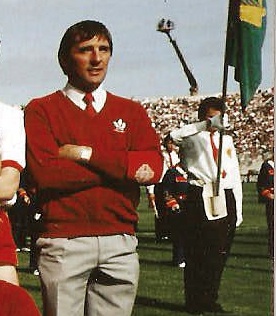
“With twelve minutes to go, we were eight points down,” says the man who guided Derry minors through the end of the eighties and into the nineties.
The opposition were Cavan and the occasion an Ulster semi-final. Having disposed of Fermanagh in round one, the base of which was ‘St Michael’s Enniskillen who were starting to come good in the colleges’ football’, the favourites for the competition faced the nightmare scenario. Minor football is an unforgiving business. When it’s over, it’s over.
It was time for John Joe to unleash a genius of a ‘baller from Dungiven. 2-02 in the closing stages from Eunan O’Kane combined with the efforts of his club mate, Ryan Murphy, pulled Oak Leaf ambition back from the brink.
“They got us out of jail,” says Kearney.
“Declan Bateson had been playing corner forward and playing really well. But Eunan was playing very well for St Pat’s too. He had difficultly knocking Declan out of his place as he was playing so well. When he came in, he came in and did the job though.”
Kearney would later present O’Kane with a copy of the ‘tape of the semi-final’, saying: ‘we wouldn’t have won an All-Ireland without you’
Enlarge
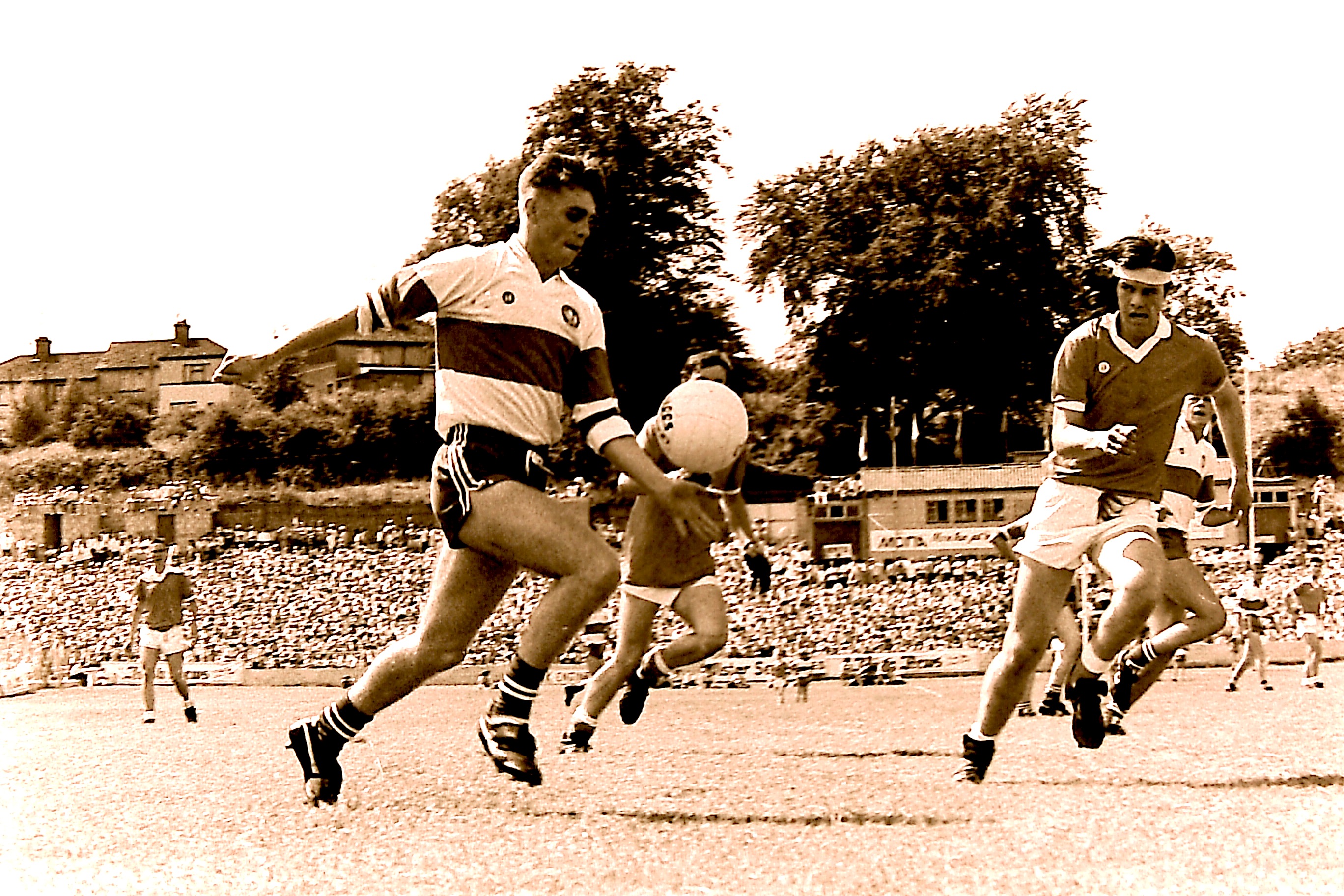
Picture: Danny O'Kane
It was a pivotal moment in the campaign. After that escape, the squad never looked back. A comfortable Ulster final win over an Armagh team featuring Neil Lennon and Kieran McGeeney was followed by defeat of New York on a warm Ballinascreen Saturday, and a Croke Park encounter with Roscommon leading to an All-Ireland final against Offaly.
“It was a big occasion but a lot of the players were used to big occasions playing colleges football. But when you step up to county level, it’s another step,” explains Kearney.
The final itself, although not an anti-climax to the season, doesn’t grab the headlines. Kearney’s charges were comfortable enough winners against Offaly. Being the people with the responsibility, managers often view occasions differently from supporters or players.
“The biggest disappointment that we had was that Jarlath Martin, who had played for us all year, and played brilliantly at corner back, staved his fingers in the first five minutes. He happened to be marking Offaly’s key forward and we had to make a decision. So, we put Karl Diamond on and he played very well when he came on.
“It was very hard to take Jarlath off but that was the decision that had to be made and we did it. He was obviously suffering. It’s very difficult when a lad has played very well for you all year to take him off in an All-Ireland final. But we have spoken since and I don’t think he holds any grudges or anything.”
John Joe Kearney – along with Mickey Gribben, Mickey Bradley and Willie Hampson – had guided the group to glory that September afternoon but, as a management team, were always mindful on the continuity of minor football:
“To win an All-Ireland final you have to have a good team and play well on the day – things have to run for you. But as a group they were all individually talented footballers and a good few of them went on to the senior team and to win an All-Ireland senior. I think that was the proof of the pudding that a good few of those players were very capable.”
Enlarge
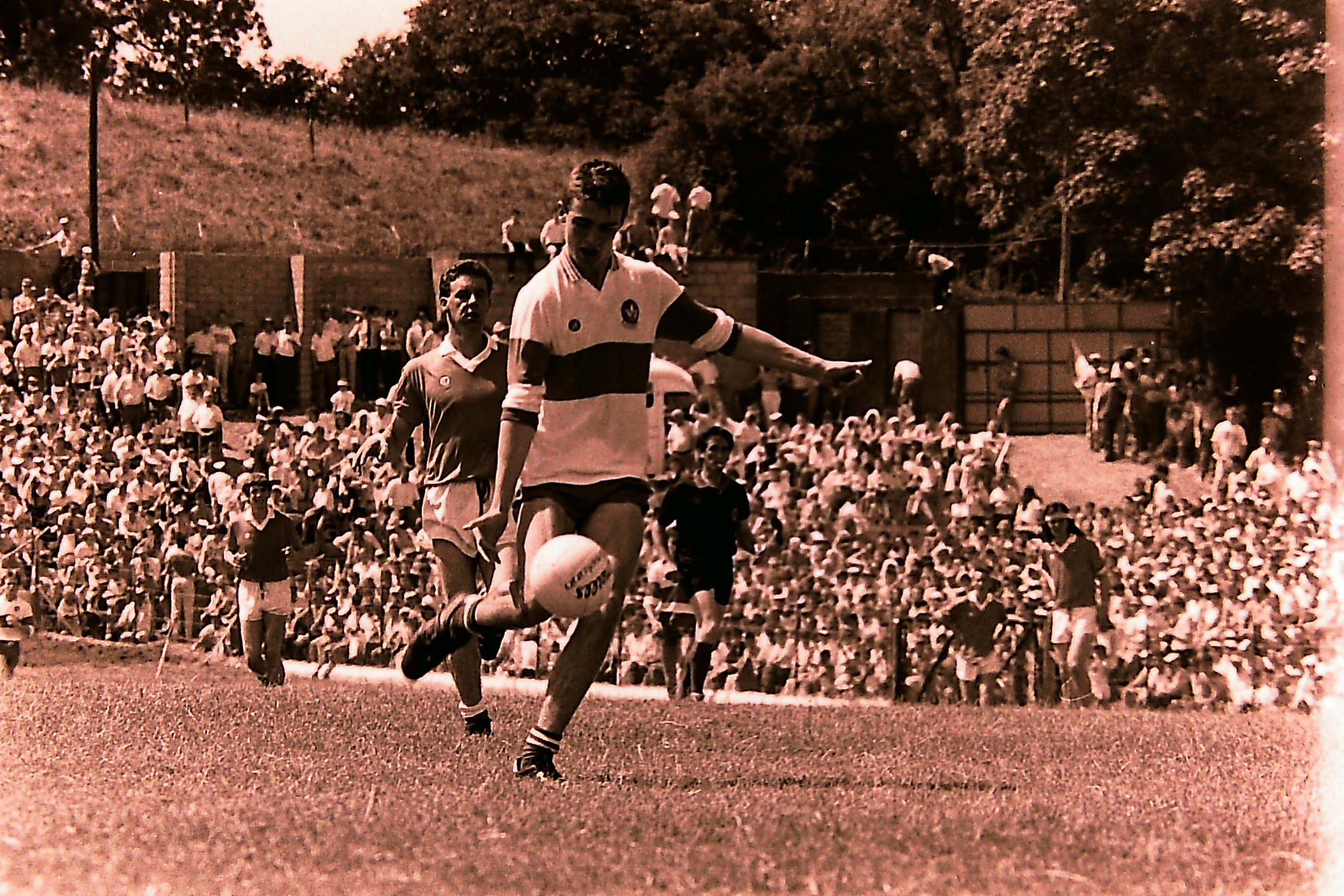
Picture: Danny O'Kane
In 1990, a number of the players returned and so too did the Ulster title. Things weren’t quite right though, as Kearney explains:
“The following year, although we lost a number of them, we went back to the All-Ireland semi-final.”
A Graham Geraghty inspired Meath accounted for Kearney’s charges on their way to the title. It wasn’t entirely unexpected though:
“If you take the lads that were playing colleges’ football, then the county picked them up [in 1989] and then they were back at school and playing colleges’ football again.
“The following year in ’90, after playing right through with the college, we picked them up again, and I always remember the final training session before the semi-final because there was only half of them turned up.
“They were completely jaded. On the day, they were just played out.”
Continued commitments had taken their toll on the players and it had to come to an end.
“It’s very sore on lads at that age and we found that out in 1990,” concluded Kearney.
*****
Enlarge
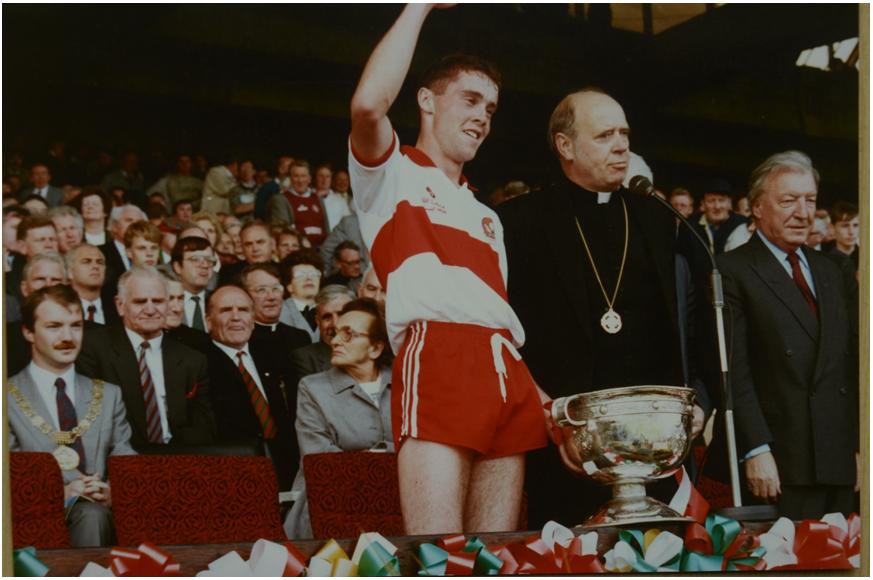
Picture: Danny O'Kane
For a young boy’s introduction to county football, watching your father manage a team to victory in Croke Park on All-Ireland final day, isn’t bad. For an 11-year-old Gary Coleman, later captain of the ’89 minors, the All-Ireland minor final of 1983 was a defining event:
“Ever since that day all I wanted to do was to play for Derry,” he states emphatically.
Climbing the steps of the Hogan Stand is the dream of every young player who has ever kicked an O’Neill’s ball. For Gary Coleman, he did so at 17 years of age.
“I was captain of the team and it was an unbelievable feeling to go out and win it,” he says. The elation was short lived, initially, as thoughts quickly turned to his final duty for the day:
“I was nervous about my speech, speaking in Irish and me not too fluent in Irish! It was all great, we had the game won and it was over and all I could think about was that I didn’t want to mess up now, with the speech. It was a great feeling, only the third Derry minor team to win the All-Ireland.”
On the game itself, Coleman, like Kearney, doesn’t dwell on the details:
“It was comfortable enough in the end but Offaly were quite good too. They won an All-Ireland minor hurling title the same year. Things were going well in their county. But once we got over that Cavan game we never looked back and were a completely different team after that.”
For a boy who dreamed of playing for his county, it was a natural step. And it wouldn’t be the last one he would take either. Like nine of his colleagues from the panel of 1989, Coleman went on to play senior inter-county football. There was no let up but also no steady stream of success either. It took time.
A glance at the history books shows that Tyrone won three-in-a-row Ulster U21 titles (90, 91, 92).
“Tyrone was very strong at that time. We drew with them in Omagh and then they beat us in the replay at Maghera. There wasn’t much between the two teams to be fair,” says Coleman.
“Things were very different from minor though. Different players came on. We were training away with the seniors and wouldn’t have been near the u21s as much,” he explains.
Some changes in personnel were inevitable and some forced. With Anthony Tohill taking up the offer of professional sport in Australia, it was a blow to the team; temporarily, of course.
“I knew Anthony from playing u12s – Magherafelt v Swatragh; they kept beating us in all the underage finals so I knew exactly how good Anthony Tohill was – a fantastic player”
“He came back from Australia and had filled out into a big man. It was nearly the making of him.”
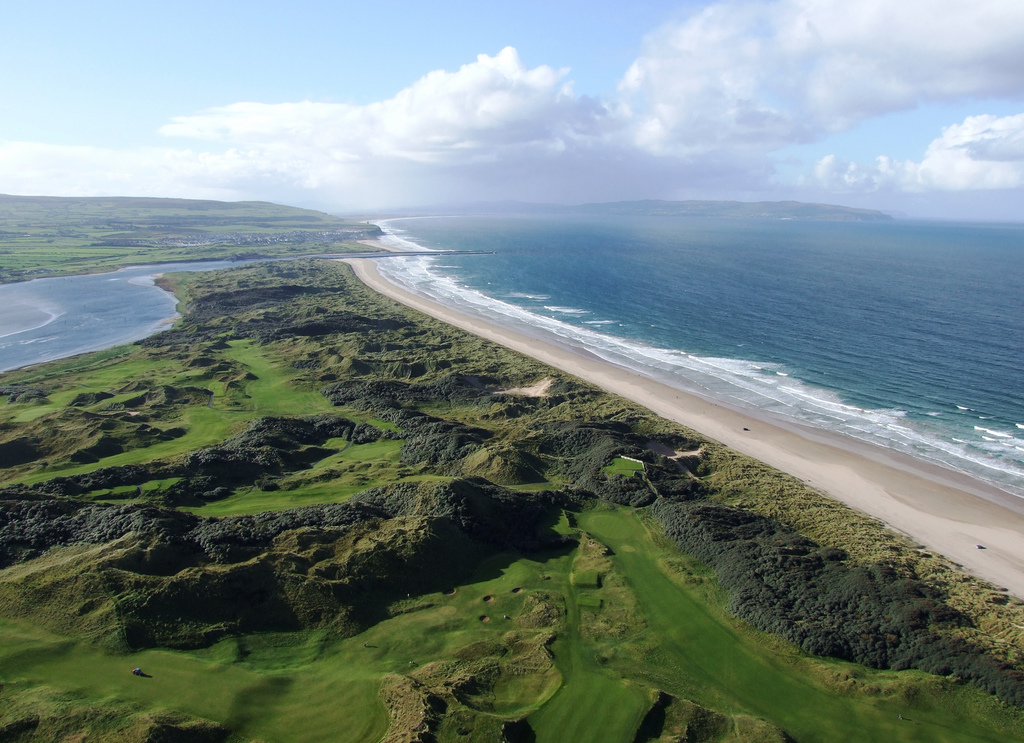
PORTSTEWART STRAND, SUMMER 1989 — normally the preserve of dog-walkers, sun bathers and surfers. Twenty-three young men line up near the end of the Convent Walk. The aim is to cover the distance between where they stand and the Barmouth wall, and back. For a 16-year-old Karl Diamond who has just finished his GCSE exams, this is heaven. John Joe Kearney gives the order and the would-be best minor squad in the country set off.
Now a father to four boys, Karl Diamond takes up the story:
“Six of us, after we got out of sight, sat down in the middle of the beach and sunned ourselves. We watched the rest of the boys run right down to the Barmouth and back again.
“As they came back we realised they were sweating buckets so we threw sea water on our faces. Ryan Murphy was involved and I think Dermot Heaney too.
“We caught the rest of the boys and beat them on the way back.
“John Joe put the arm around us when we got back a hailed us: ‘Great running boys, that’s the attitude I want to see’.
“The best part was the rest of the team didn’t grass us up!”
Diamond’s story is told for a reason. The group was all about the camaraderie enjoyed among the players.
“We all sat down, in Garvagh I think, coming back from the Strand and had Chicken and Chips. At the time it was amazing to sit down and eat together. It’s probably common practice now and boys take it for granted.”
Enlarge
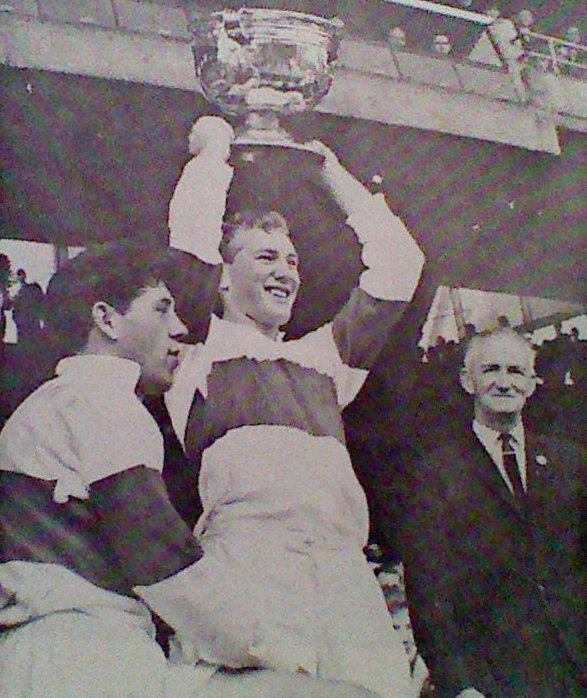
Karl Diamond was an All-Ireland winner and was still under 16. Under today’s rules it’s a medal he wouldn’t have, as he is keen to point out:
“At that stage I didn’t drive. I was still under 16. With the new rules that came in I wouldn’t have been able to play, something that I don’t agree with.
“Take Eunan O’Kane for example. His whole career peaked around minors. Why not give that lad a chance to win a minor title on a strong team? I don’t agree a lad should miss out because he is too young. Burn out is an issue for sure, but if the players are managed properly, it shouldn’t be an issue.”
Coming from a bloodline of winning tradition, with his father Tommy the first Derry man to captain an All-Ireland minor winning team in 1965, Karl Diamond graduated through the St Patrick’s Maghera system under the tuition of one of the original masters of football psychology, Adrian McGuckin.
“Coming off the back of a Hogan Cup win we just filtered into the thing right away – were made feel part of the squad immediately. You had some fantastic footballers there even before the fellas who had been with St Pat’s joined. But the integration was fantastic, and a lot of that has to go down to John Joe and Mickey and Willie Hampson and those boys – making it easy to transfer across.
“There was no us against them, it was just Derry.”
Transferring between teams was made easy for Diamond by the team management, as was transferring between school and football life. Not part of the squad until after the Ulster final of ’89 due to exam preparations – something Diamond still regards as a wise decision by his father – the release brought about by joining the squad whetted his appetite even more for the game he was reared on in the Bellaghy blue.
A blonde haired dynamo on the pitch, he wasn’t alone in the looks department for club or county. John Mulholland, midfield colossus in ’89, acted as mentor, taxi driver and purveyor of ‘the craic’.
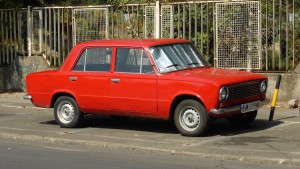
“John would lift me for training and leave me home. He drove a red Lada in which he raced half a dozen of the other players over the Glenshane every week, often using the hard shoulder. There was dust everywhere!”
John Mulholland was one half of a midfield partnership on the minor team of 1989, the other being a young Swatragh man – Anthony Tohill.
“Anthony Tohill – he was brilliant from then on – but at that age, believe it or not, John was every bit as good, if not better. John was phenomenal and probably would have been man of the match in the final, or not far off it. He was probably the pick of the two midfielders.
“Anthony went to Australia after it of course and it gave him a year of professional football which helped. Big John actually was picked to go at that time as well and didn’t go.
“They were both phenomenal footballers. Look, we were lucky, we had some brilliant footballers.”
*****
FÓMHAR – the Gaelic word for the period of August through to October – consists of the beginning, middle and end of the harvest. For farmers everywhere it’s a make-or-break time and likewise for championship football. To further the footballing analogy, it can often take several cycles of harvest and attention to get the maximum yield.
Although there is no one recipe for success, the Sam Maguire history makers of 1993 had a unique blend with members of national title winning teams to the fore.
Gary Coleman agrees:
“You had the ’83 minor team and then our minor team and with Lavey coming through at that time, everything added up to the success we had.”
“If you get three players out of any minor team, that’s usually a good return but we got a quite a few at that time.
The schools angle is also often talked about.
“Maghera were going very well at that time. They had won two Hogans and football was very strong.
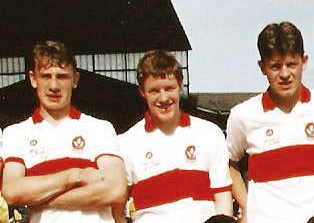
When things got going at St Pius X under Brian McIver, the success followed. All-Ireland vocational U16 titles in 1985 and 1987 prompted a jump to Colleges football in 1990. Gary Coleman was one from the stable:
“Myself, Dermot Heaney, John Mulholland and Jarlath Martin were with Brian at St Pius X. They always talk about the Maghera team but there were four St Pius’ players on that minor team.
“I played on the 1987 U16 team – the four of us played on that team,” explains Coleman.
“I loved playing under Brian McIver and I learned an awful lot from him.”
The poignancy of what follows is as subtle as it is unforgettable:
“I always say he was the second best manager I played under, and I don’t think he’d mind me being biased and saying that Daddy was the first.”
*****
THE REUNION 25 years later will be a chance for the men to come together again.
“Wee Martin O’Connor went to the states and I’ve not seen him since. Rory McEldowney – I think I’ve seen once since. And John O’Connor, who was a real talent, I don’t think I’ve set eyes on him since,” says John Joe Kearney.
John Joe will no doubt recall how he intended to change the captaincy in 1990 and how Karl Diamond asked that Gary Coleman, captain in ’89, be put in front of him.
“To turn down the captaincy of a county minor team was a big thing. I always thought that that was something very big which Karl did – to let Gary keep it for another year.”
From Gary’s point of view, it will be an occasion to savour:
“Some players that I wouldn’t have seen in 20 years and I just hope I recognise them! When fellas got over the age of 21 you never would have seen them unless you were playing against them at club level. And then some players would have played a couple of years more and that was them finished with football. It’s a long time since I’ve seen a lot of those players.”
Karl Diamond will recall how a few nights before the All-Ireland final, the players met at Slaughtneil, and how after an initial meeting, Mickey Gribben said to everyone: ‘ok boys, this is the big one. This has to be right.’
The anticipation grew among the players. What was Mickey’s masterplan?
“He lined us out in the changing rooms as we would be for the photograph in Croke Park! And people talk about preparation”
Gregory Simpson had a bet with Karl Diamond in the summer of ’89 that the Bellaghy man, thinly thatched at the time, would lose his hair first.
“Well, I’m still the same as I was and Gregory is as bald as a coot,” spurts Diamond.
The camaraderie prevails.
*****
Derry minor football panel 1989: Martin O’Connor, Jarlath Martin, Paddy McAllister, Gregory Simpson, Barry McGonigle, Gary Coleman, Roderick Skelly, Anthony Tohill, John Mulholland, Eamonn Burns, James Lynn, Rory McEldowney, Eunan O’Kane, Dermot Heaney, Declan Bateson, Ryan Murphy, Eugene Lynch, Feargal Kearney, Dermot Dougan, John O’Connor, Karl Diamond, Dolan O’Hagan, Michael O’Donovan. Management team: John Joe Kearney, Michael Gribben, Michael Bradley, Willie Hampson
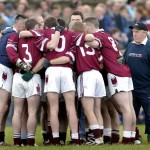
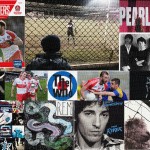
[…] >> Click here to read the full story […]